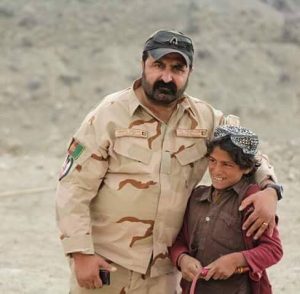Commander Col. Azizullah Karwan, considered ruthless by many in the country, had reportedly survived 38 previous assassination attempts
[Islamabad]—Afghanistan’s Interior Ministry has confirmed that the Taliban was responsible for the assassination of Special Forces commander Col. Azizullah Karwan last week. Karwan was shot dead while picnicking with his family in Kabul’s Firdousi Park, sources told The Media Line.
At least three more people, including a woman, were wounded in the attack. The sources added that Karwan and his spokesman were shot by Taliban snipers. Karwan was commander of the 01 Special Police Unit, which has reportedly been scoring successes against the Taliban in the Argun district of Paktika Province.
Taliban spokesman Zabiullah Mujahid said that killing Karwan was a key achievement.
Karwan is among dozens of security personnel who have been targeted in deadly assaults in the country since the Taliban ended a three-day truce on Eid al-Fitr last month. National Security Adviser Mohammad Hanif Atmar has ordered an in-depth inquiry into Karwan’s murder, according to reliable sources.
“Col. Azizullah was a professional soldier who served the country and trained its soldiers,” said Atmar. “The martyrdom of Karwan is a huge loss, but his friends and fellow soldiers will follow his footprints in full spirit.”
U.S.-led forces in Afghanistan and the Afghan National Security Forces have not yet reacted publicly to the killing.

Special Forces commander Col. Azizullah Karwan was killed by a Taliban sniper last week while picnicking with his family in Kabul. [Twitter]
Senator Juma Gul Gianwal from south-eastern Paktika Province warned that the region might once again suffer insurgencies following Karwan’s death. “He [Karwan] was a lethal warrior against the Taliban,” the senator added.
According to the same sources, Senate chairman Fazal Hadi Muslimyar also condemned the murder and urged the president and the interior minister to honor Karwan with a courage award.
Interior Ministry spokesman Najib Danish said last Friday that Karwan had led dozens of anti-Taliban operations and had reportedly survived 38 assassination attempts, many of them suicide attacks.
Provincial leader Nadir Katawazi said that the commander’s death was a serious blow in the battle against the Taliban. He had cleared hundreds of Taliban from the eastern area and was regarded as the “deadliest” anti-Taliban warrior, Katawazi claimed.
Jamal Tajik, an Afghan police official, told The Media Line that Karwan played a pivotal role in the security of province. “Due to his success in confronting the Taliban, he was like a thorn in the group’s eyes,” Tajik added.
Karwan was laid to rest in his ancestral cemetery in the Urgon district of Paktika Province. Paktika police chief Brig.-Gen. Mohammad Azeem Hashmi, who took part in the burial ceremony, said the slain soldier had worked hard for security and stability in the region.
The commander’s relationship with the U.S. military began in 2001 when he was hired as a mercenary to protect a U.S. Special Forces base in Paktika. Sources claim that he also took an active role in combat operations with U.S. forces.
Karwan served in the local police for more than 15 years until he took command of Afghanistan’s Special Forces unit.
Prof. Sajid Bukhari, a historian and Afghanistan expert, told The Media Line that Karwan was an ethnic Tajik, who was bitterly opposed to the ethnic majority Pashtuns. With both ethnic groups at loggerheads for centuries, it is natural that opinions on his death were divided.
According to Haseeb Mujahid, a journalist, the commander’s unit had allegedly been involved in torturing and killing civilians during search operations.
Habib Jan Achakzai, a former Member of Parliament and Pashtun cleric, told The Media Line that during Karwan’s tour of duty in south-eastern Paktika Province, friction between the Tajik and Pashtun communities had never been so high.
In 2015, United Nation’s Human Rights Watch released a report about eight “strongmen” in police, intelligence, and militia forces responsible for serious human rights violations in Afghanistan. Karwan was among those listed in the report.
Speaking with The Media Line, Afghan police official Jamil Tajik strongly rejected the U.N. report, claiming it was baseless and a “plot to defame Afghan leaders.” He emphasized that Karwan had always followed instructions from high officials and had never killed an innocent person.
Deputy Director of the U.N.’s Human Rights Watch Asia Division Phelim Kine said that the Afghani administration had taken the welcome step of launching a national action plan to eliminate torture.
The U.N. reported in earlier this year that civilian casualties in Afghanistan had decreased by 23 percent between 2016 and 2017 as a result of Afghanistan’s attempts to stem civilian deaths.